
19 minute read
A bad day in court
Migrant Protection Protocols are frustrating asylum-seekers, attorneys, and judges
mong all the immigration policies that the
Advertisement
Trump administration has implemented, one that’s most frustrating to immigration lawyers and judges is the Migrant Protection Protocols (MPP), also known as the “Remain in Mexico” program. Under MPP, the government is no longer allowing asylum-seekers from Spanish-speaking countries to wait for their court hearings in the United States but is instead sending them to border cities in Mexico for the duration of their immigration proceedings.
The Department of Homeland Security claims MPP will help “restore a safe and orderly immigration process.” It also claims the policy will protect migrants from smugglers and traffickers. Meanwhile, lawyers and advocates claim “Migrant Protection Protocols” is a misnomer: It doesn’t “protect” migrants but places them in danger.
I visited the San Diego Immigration Court to witness for myself how MPP affects asylum-seekers in court. For four hours I sat in during the preliminary court hearings of asylum-seekers whom the government had sent back to Mexico under MPP.
The first thing I observed was how bored and frustrated Judge Lee O’Connor looked. He rested his chin in his right palm, dragging his cheek down as he asked the respondents a question he had been asking all day: “Why are you here without an attorney?”
The respondents, a husband and wife whose young son had fallen asleep on his father’s shoulder, replied in Spanish: “We called everyone on the list of attorneys you gave us.” The list they refer to is a list of immigration law firms that all asylum-seekers receive before their first court hearing. One asylum-seeker in
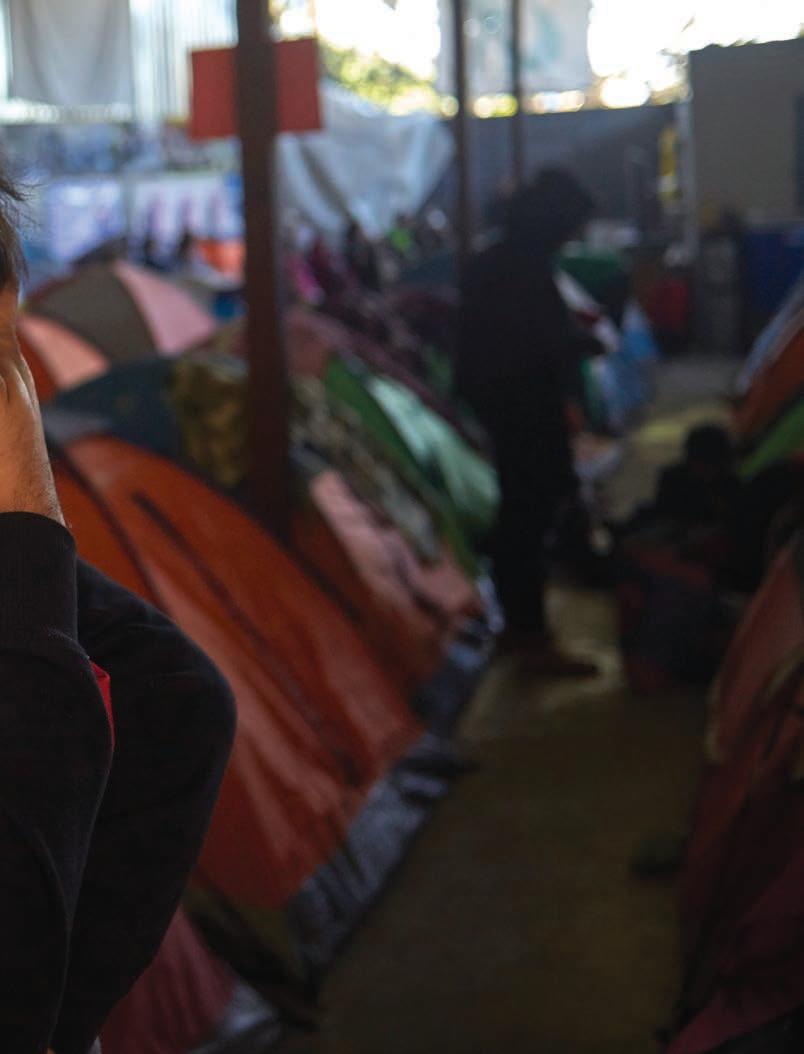
Juan Carlos Perla kisses his 10-month-old son, Joshua, inside a shelter for migrants in Tijuana, Mexico. After fleeing violence in El Salvador and requesting asylum in the United States, the family was returned to Tijuana to await their hearing in San Diego. Ciudad Juárez let me read his: It’s a onepage document with the names and phone numbers of pro bono law firms— four based in Washington, D.C., one based in Baltimore. The sheet is useless, as the couple found out: “Everyone we called said we need to be in the U.S. to be represented.”
The judge asked for the umpteenth time: “Did you ask the offices you called for recommendations of other lawyers?” The husband said, “Sí. But even they all said they can’t represent us.”
The judge’s expression remained bored: “If they say they can’t help you, then you ask them for names of other lawyers to call. Did you do that?”
“Yes, but they also cannot help us.” The husband explained that he would leave his name and phone number with the receptionist, but nobody calls back, despite his numerous attempts to reach someone.
The judge said in a tired voice: “Call anyone else?”
“The answer’s always the same: They can’t help us. Or they recommend the same people on the list.”
The judge sighed: “All right. What would you like me to do? You want additional time to find a lawyer?”
The wife spoke up: “No. We’ve tried and tried. We want to continue with court proceedings”—meaning, she wants to move on to the merits hearing, where the judge will address their legal claims for asylum in detail.
The judge raised his eyebrows: “What about looking for private attorneys?”
“We found one lawyer in Los Angeles through social media. He agreed to represent us, but he said we have to pay in advance.”
The judge searched for that attorney’s name on his database. There’s no attorney by that name in LA, he said: “You sure he’s an actual attorney?”
The respondents looked at each other, then said, “Honestly, we don’t know.”
The judge warned them about scammers. There have been too many cases of notaries public who offer legal assistance for thousands of dollars but aren’t actually qualified to represent people in immigration court. They prey on immigrants because they’re vulnerable, gullible, and desperate. As the respondents realized
they may have nearly been scammed, they went still.
The judge reminded them that since they have no legal visa to stay in the country, they’re currently at a master calendar hearing, a preliminary hearing that begins the government’s efforts to remove them from the country. The respondents looked at each other: “We’re confused. We’re asylum-seekers.”
Evidently they didn’t understand that even as asylum-seekers, they have to undergo a removal proceeding, from which they can ask for relief as asylumseekers. It’s all part of due process, but immigration law is so complicated that even immigration lawyers tell me they get confused.
The judge sighed at their confusion: “If you have trouble understanding this basic thing. … You need to find a lawyer. Immigration law is very, very complicated.”
The woman’s voice sounded strangled: “But we don’t have any resources to pay for an attorney.”
The judge threw up his hands: “Well, ma’am. I don’t know what to tell you. I
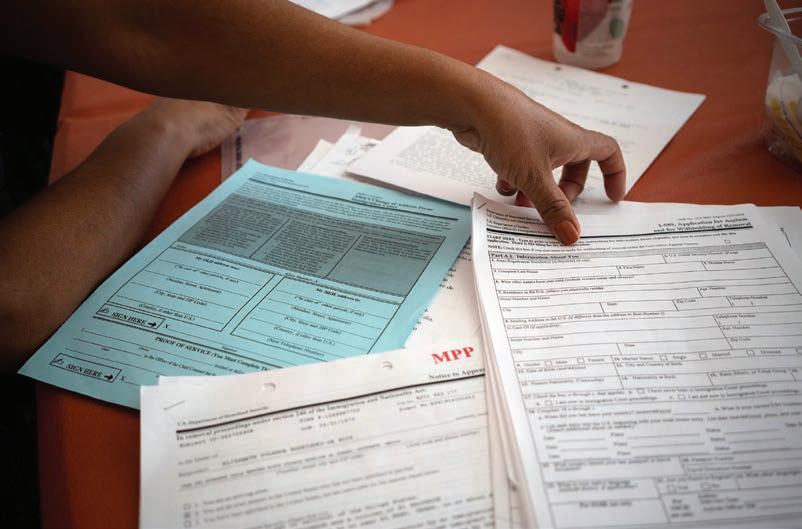
tell you DHS has charged you with removability from the U.S., and you look confused. I can’t go forward in this case when you don’t even understand that basic thing.”
The woman protested, “But in no point in time did we try to enter illegally.” They had presented themselves at the port of entry, and then the government had sent them back to Mexicali, Mexico, under MPP.
The judge explained to them that even though they didn’t enter illegally, they can still be denied entry because they don’t have a legal visa. “These are things an attorney would be able to tell you,” he said, and declared he was giving them more time to find an attorney, even though everyone knew the likelihood of that happening was near zero.
The couple picked up their son and left the courtroom, still looking confused but now also looking dejected.
A woman stepped up with her teenage daughter. Then a man with his teenage son. Then a woman with her two toddler daughters. A man alone. Another woman alone. Over and over, the judge asked, “Why are you here without an attorney?” Everyone gave the same answer: No attorney would represent them when they’re not based in the United States. I also saw the judge berate respondents over and over again for not filing a home address.
One respondent answered, “I don’t have a specific place I’m living in.” Like many migrants stuck in Mexican border cities under MPP, he’s homeless. He and his son are hopping from place to place, sometimes landing a bed in a shelter, or sleeping on the streets.
The judge asked: “Why is it so difficult to get a post box somewhere?”
The man said that for a while he couldn’t find a stable job, so he couldn’t afford a post office box. Another woman, when the judge asked her the same question, said she’s unfamiliar with Tijuana and got lost looking for a post office. Another man said he moves from place to place, looking for a job so he can survive the many months he has to stay in Mexico. The judge asked each of them, “Then why not find someone you trust and use their address?”
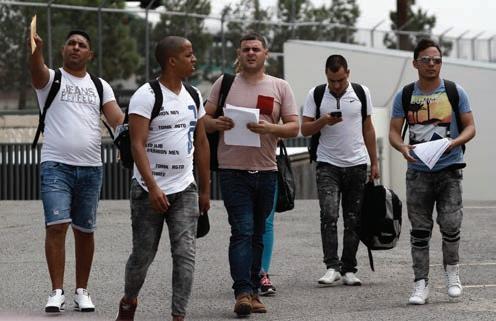
A migrant from El Salvador (left) shows her documents from Migrant Protection Protocols, which she must complete in English to submit at her next court hearing. U.S. asylum-seekers (above) walk away from Mexican immigration offices after they were returned by U.S. authorities to wait in Mexico under the Remain in Mexico program.
Again—that’s not possible for many migrants. They don’t know anyone they trust in Mexico.
“Well, I told you numerous times what you have to do,” the judge said. “It’s up to you. I can’t force you to do it. You’re putting yourself in jeopardy.” Not submitting an address is a serious due process issue: Without an accurate address, the government will mail any notices that the respondents need—the “notice to appear” letter, the charging documents, court dates, possible changes to court dates, copies of transcripts and appeals, the judge’s written ruling—to “No Domicilio Conocido” or “Unknown Address.” That mail will obviously go nowhere.
That’s also a consequence of MPP. If the asylum-seekers had been allowed to stay in the United States, they would have given the address of their sponsor— typically a family member, relative, or friend living in the United States. But most of them don’t know anyone in Mexico.
At times, the judge turned his frustration toward the DHS attorney in court. Too often, he said, the government is charging the respondents with the wrong charges, mixing people who entered at port of entry with those who entered between ports of entry. People who sought admission at a port of entry should be charged as “arriving aliens,” while people who cross the border between ports of entry should be charged as “Entry Without Inspection.” Because the judge can only rule when charges are accurate, he has to dismiss any cases with wrong charges. That day, he did so in the case of at least one respondent—a man and his young son. That hurts the man, because it means his case will restart from scratch, further prolonging his wait in Mexico, in his case Mexicali.
About half the respondents in court came from Tijuana, while others traveled to San Diego from Mexicali, which is about 110 miles away from the port of entry in Tijuana. The respondents are responsible for showing up at the port of entry on time. Some have to appear at the port of entry as early as 4 a.m. Those who don’t show up on time run the risk of the judge ordering their removal in their absence. For those who arrive on time, a bus and armed detention officers will take them to the San Diego Immigration Court and then escort them right back to Mexico.
These detention officers keep watch on them the entire day: I even saw one officer stand guard by the door as a female asylum-seeker and her daughter used the restroom. Most of the respondents also showed up in court with their kids. It’s tough for the children—they’ve been waiting for court for up to eight hours, which is boring and tedious even for adults. The DHS attorney was sympathetic—she passed out drawing paper and crayons to fidgeting kids. The judge did not seem as sympathetic. When one little girl kept interrupting her mother, the judge snapped, “This is why you don’t bring young kids to court.” But where would parents leave their kids for a whole day in a foreign city?
Later, I met up with Margaret Cargioli, a San Diego–based immigration attorney for Immigrant Defenders Law Center, a law firm that takes immigration cases pro bono. Her firm is one of two or three immigration law firms that regularly send lawyers to Tijuana to take MPP cases— that’s a handful of lawyers for the 7,000 people sent back to Tijuana under MPP. Cargioli said MPP has made her job as a lawyer extremely challenging: It’s hard to develop trust with her clients when they’re mostly communicating via phone calls or text, and many are so engrossed in simply surviving in Mexico that they’re unable to focus on gathering the necessary paperwork for their asylum case. She said one client’s son almost got kidnapped. Another client had to bribe local officers because they were harassing him on the streets. Yet another got caught in a shootout while visiting a store in Tijuana.
But very few migrants dare report such incidents to local police. One woman in the United States called Cargioli on behalf of a family member under MPP in Tijuana. The woman said her family—a mother and child—had been kidnapped in Tijuana, and thus the mother probably couldn’t make it to her court date. She asked how she could explain to the judge what happened, and Cargioli encouraged her to report it to Mexican authorities. “But she was too afraid,” Cargioli recalled. “She said, ‘How do you know the police there will actually help?’ She never called back.” Cargioli said she doesn’t think MPP achieves anything positive: “I think it’s a deterrence policy. The idea is that if we make this an extremely miserable process for people, we’ll stop getting the number of individuals coming. That’s not taking into account the reality of the circumstances these people are fleeing.” A
A vocal group of young African Americans wants to change the face of conservatism conservative YOUNG, BLACK, AND
By Harvest Prude | Photo by Lee Love/Genesis
Olivia Rondeau is used to facing tough opponents. The biracial Maryland native started wrestling as a freshman in high school, and in 2017 she made history by becoming the first female wrestler to win gold at the AAU Junior Olympic Games. But her toughest battles have come in a very different arena—the online wild west of social media, where users navigate political correctness, angry mobs, and “cancel culture.”
Around nine months ago, Rondeau posted a video to her YouTube channel—previously used just for her wrestling videos—titled “Why I Am Blexiting.” The term Blexit refers to a movement founded by conservative commentator Candace Owens that encourages the “black exit” of African Americans from the Democratic Party. In the video, Rondeau described why she rejected Democratic values and policies, such as the welfare state.
Owens shared the video, and a star-struck Rondeau found herself ushered into an energetic group of like-minded young adults and teens, many of them sporting outsized online followings.
These kids log on to Twitter every day and challenge all the stereotypes of their generation by being young, black, and some of President Donald Trump’s most outspoken supporters. And sometimes, they pay a price for it.
Rondeau did not always identify as conservative. She remembers how elated she felt both times former President Barack Obama won election. “We were a big Obama family,” she told me. Her dad believed Obama’s “hope and change” platform meant big changes for the black community on mass incarceration, the drug war, and unemployment.
Eight years later, disillusioned with a presidency they felt hadn’t lived up to its promises, her parents voted for Trump. Rondeau, who had begun watching Owens’ videos, underwent her own political transformation.
“Basically, it became a thing where, we can’t trust Obama just because he’s black, and we can’t distrust people because they’re white or Republican,” Rondeau said. “It came down to who is going to do the best by our community and our country.”
Rondeau soon began to get attention for her online presence. She now boasts 1,400 YouTube followers and 26,200 Twitter followers. She also began to meet up with others in the group, some at conservative and Republican events, and even landed an invitation to the White House in February for Black History Month.
Olivia Rondeau
conservative
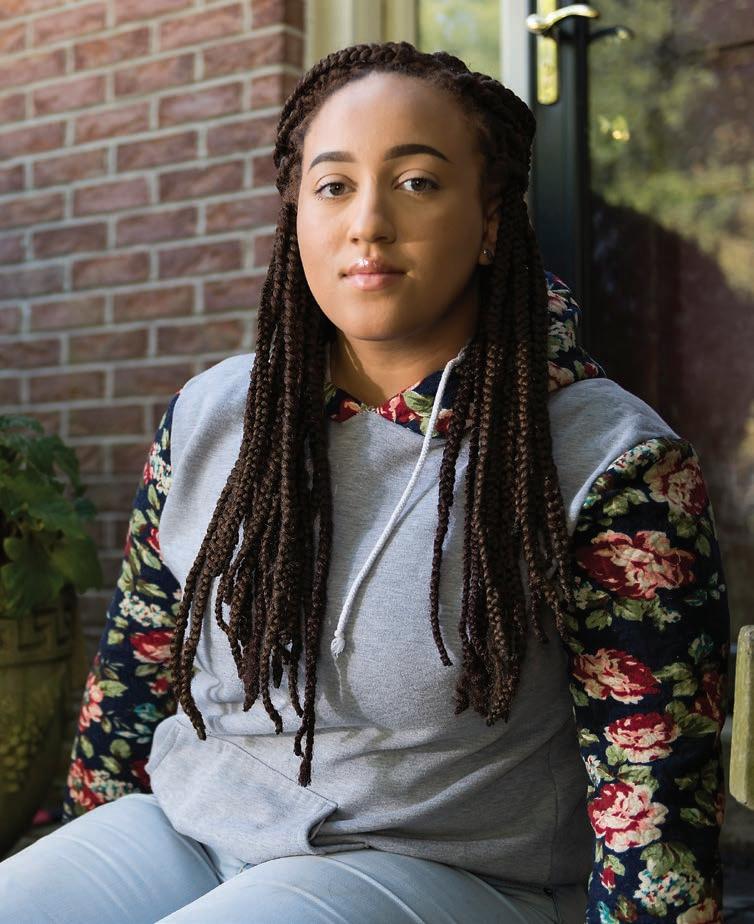
One of those she met was CJ Pearson. When it comes to the label “young black conservative,” Pearson used to have the market cornered. He went viral at the age of 11 after uploading a YouTube video posing the question “President Obama, do you really love America?” It racked up more than 2 million views.
Pearson first discovered his interest in politics in elementary school, when his teacher held a mock election. The students had to research the candidates in the 2008 presidential election and choose which one they wanted to support. Pearson read the news, watched a debate, and later cast his mock vote for Republican nominee John McCain. Though his parents are lifelong Democrats, Pearson told me that after continued research, he decided “conservatism was common sense to me. … It sounded a lot like what you did at home.” Now 17, the self-described populist conservative is mastering a new kind of political commentary. He blasts out short videos on Twitter to his 310,900 followers, reacting to the news of the day and taking aim at Democratic talking points with his homegrown Georgia drawl.
It’s made him plenty of enemies. One of his regular opponents is Roland Martin, a prominent African American political commentator and former CNN contributor. In one particularly testy exchange, Martin warned that Pearson would get his “[obscenity] whipped” for getting into “grown folks’ business.” Pearson fired back that “I don’t remember ANY journalist directing such violent hate towards the Parkland kids. Different rules for conservatives, I suppose.”
Anthony Bradley, author and professor of religious studies at The King’s College in New York City, has tracked the burgeoning online activism of young black conservatives with interest. He says the unexpected nature of the combination of young, black, and conservative—“in the era of Trump of all eras”—explains some of the rancor the group has drawn.
“To me it’s absolutely ridiculous that you’re going to attack a bunch of teenagers and college students,” Bradley said. Teenagers naturally fight for causes and challenge the establishment, he said: “It just so happens that this iteration of black youth rebellion against existing norms happens to be in favor of Donald Trump … and because of that, people are losing their minds.” Pearson has had some well-documented political missteps, including a stint when he disavowed the Republican Party and backed independent Vermont Sen. Bernie Sanders’ presidential campaign in 2015. Not long after, he recommitted to conservatism and landed on the Trump campaign. He partially attributes his missteps to CJ Pearson
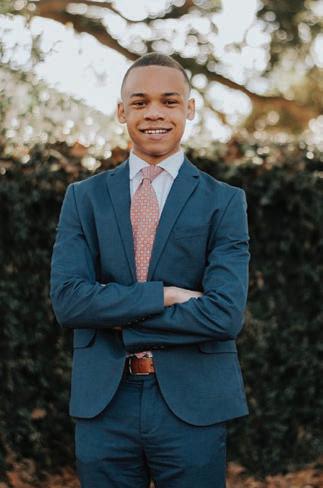
not having mentors or a community around him back then.
A little over a month ago, Pearson encouraged his followers to share why they had left the Democratic Party with the hashtag #BlackNotDemocrat. Within hours, the hashtag rose to one of Twitter’s trending topics.
In a phone interview he told me he started the hashtag because “stigma is the biggest thing we have to tackle.”
Pearson said he did not specifically brand the hashtag as Republican because his goal is not necessarily to convince African Americans to switch parties. Pearson said he’ll question both parties when necessary, though he thinks Democrats should be challenged not to take the black vote for granted. Nothing quite prepared Rondeau to deal with the amount of verbal abuse she would get for disavowing the Democratic Party. Strangers called her ugly, accused her of betraying her race and of being an “Uncle Tom,” and cast other racist slurs. She said she had to report one threat to come and find her from someone who lived nearby in Maryland.
Rondeau said she believes some of the hateful comments stem from “a huge misconception that black people who consider themselves Republican are anti-black or secretly white supremacists or hate themselves.” At first, a somewhat shaken Rondeau locked down her social media accounts to private. But she decided to resurface after considering her reasons for speaking up in the first place: “I consider myself very pro-black, that’s why I decided to be an activist and outspoken; I believe Democrat policies harm black communities the most. … That’s why I want to make a change.” She made a YouTube video responding to the insults to show “I wasn’t taking it that seriously, that I was laughing at the stupidity of people who would refuse to debate me but just call me names.”
Another young black conservative unafraid to spar with critics is 17-yearold Khaliq Rodriquez. Hailing from Harlem, N.Y., Rodriquez said almost everyone he knew voted for or identified with the Democratic Party.
So when he started identifying as a conservative online in 2016, “people I thought I could call friends … completely disavowed me as soon as I chose to think differently.” Classmates accused him of going against his race by voicing support for Republican policies.
Rodriquez had started to question Democratic policies after experiencing a night-and-day difference in quality between public schools in his Harlem neighborhood and the private school he attended after earning a scholarship. He still doesn’t understand why, faced with abysmal reading proficiency statistics, fights breaking out in the halls, and outdated textbooks in some of the worst Rodriquez said. “If parties fight for their votes—just like with school choice—then you get the best outcome.”
Justin Corbin is another teen who worked with Rodriquez in the Black Conservative Movement. Unlike Rodriquez, he grew up in a rightleaning family. He remembers listening to conservative talk radio hosts like Rush Limbaugh and Glenn Beck in the car.
“I don’t think my mom realized she was creating a monster when she was playing it,” Corbin said. He jumped into politics by starting a side
Khaliq Rodriquez

public schools, local Democratic politicians dismissed school choice as a racist Republican idea.
After that, he started to look into other conservative ideas. “Schools were the big red pill for me,” Rodriquez said.
Rodriquez became national chairman of the Black Conservative Movement, a grassroots effort entirely run by young black teenagers. The group has 97,800-plus followers on Instagram, nearly 15,500 likes on Facebook, and 27,300 followers on Twitter. The group’s main goal is to give young African Americans an alternative to the Democratic platform.
“It’s black people’s responsibility to make parties fight for their vote,” Justin Corbin
hustle, Jumpstart Strategies, that offered social media strategy for campaigns. After being featured in Students for Trump, he connected with the other teens from the Black Conservative Movement.
Corbin told me he’s wrestled with whether the movement is simply regurgitating identity politics for the right by “encouraging hyphenation when it comes to African Americans instead of just Americans.”
He said he eventually reconciled his activism with his identity because of the strong need to reach out to African American communities: “We won’t be in good shape in five, 10, or even two years if we haven’t done something where we’re normalizing a black Trump supporter.” Trump’s rhetoric—especially during high-profile spats with minority members of Congress or when he called Baltimore a “disgusting, rat and rodent infested mess”—is sometimes a challenge for these young black conservatives. Some of the young adults I interviewed condemned Trump’s rhetoric but said their support for his policies remained unchanged.
Toby Pegues, a black conservative in his 20s, told me via email that “if someone is going to be president, I feel that they need to handle conflict in a presidential manner.” Pegues, a Christian, added that while the Twitter spats upset him, the only way Trump would lose his support “is if he blatantly disrespected my Lord and Savior.”
Meanwhile, Rondeau said she believed Trump’s tweets about Baltimore merely gave conservatives an opportunity to respond with action. On Aug. 5, she went to North Fulton Avenue in Baltimore to participate in a street cleanup. Armed with trash bags, a group cleared used needles, garbage, and other hazards from the sidewalks and roads from 7:00 a.m. to 8:00 p.m. By the end of the day, close to 200 people had participated, and they had picked up more than 12 tons of trash.
Some on Twitter condemned the cleanup as an effort of “rich white people coming in to clean up black neighborhoods.” Rondeau shrugged it off, and said she believes her critics’ tactics will backfire.
“For every hate comment, I feel like that’s one more vote for Trump because people see that and they’re like, why am I on that side?” Rondeau said. “Droves of conservatives don’t come and call people ugly and stupid, or [say] racial slurs to a black girl wearing an Obama hat.” She hopes other black teens will start to ask themselves: “Why is there a huge backlash? Why do they not want me to think that way?”
Rondeau recently began training with the women’s wrestling team at East Stroudsburg University of Pennsylvania. She took her MAGA hat with her. A



